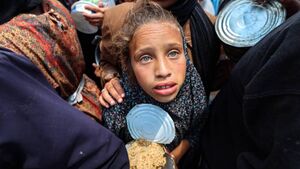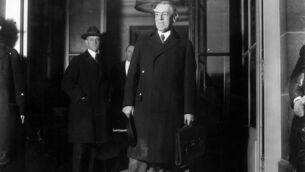Gaza is another version of the Holocaust

A Palestinian girl holds a container at a food distribution point in the Nuseirat camp for refugees in the central Gaza Strip last week. Picture: Eyad Baba/AFP via Getty Images
As I write, the headline on the front page of today’s reads: ‘Pressure builds on Israel to halt Gaza offensive’. Yesterday evening, a series of calm, sensible commentators lined up to add their voices to a credible consensus based on the chilling prediction of Tom Fletcher, the United Nations’ humanitarian chief, that ‘14,000 babies could die in Gaza in the next 48 hours if lorries of aid do not reach them in time’. After almost three months of an effective total blockage of food, water and medical supplies, experts have warned of a looming famine.
A week or so ago, Matthew Syed, a columnist in , spoke directly to his friends in Israel, in a compelling statement that deserves to be repeated albeit at some length:
Syed’s conclusion is irrefutable. It’s obvious to him that Israel ‘has been played like a violin’:
There is no doubt now but that in time Gaza will be viewed as another version of the Holocaust with, extraordinarily, the descendants of the victims of the death camps of Auschwitz-Birkenau and others finding themselves on the wrong side of history. As Syed concludes, the once effective formula of depicting opposition to Nehanyahu’s war as by definition ‘antisemitic’ is a failed strategy:
Some time back I wrote here that the Gaza tragedy was moving inexorably towards an all too predictable disaster. It was a time when any comment on the failed Israeli strategy that landed short of absolute support was batted aside with the accusation of anti-semitism. I was in good company as the inevitable broad strokes - of painting everyone who questioned the official wisdom with the same brush - involved an effort by Israel to portray the then Taoiseach Leo Varadkar and later Taoiseach Micheál Martin as antisemitic too.
The terrible burden that the Jewish people carry with them - the dreadful memory of the Holocaust - so haunts them that even contemplating for a moment any new strategy seems as if it is a betrayal of a sacred memory. As we know, the more uncompromising and rigid a party policy becomes, the more difficult it is to approach it from a different angle. And the greater the price paid for loyalty to a hallowed (and therefore) often unexamined master plan, the more inviolable the sacred ground becomes.
Yet, the more we invest in whatever shape the dream has, the more inaccessible it can become. For example, the long, hard road to a united Ireland, a treasured aspiration for most (I imagine) Irish people, paradoxically can be rendered unattainable by those who invest most in it. For example, every time, an IRA/Sinn Féin funeral of a republican activist takes place, and the great and the good gather to shoulder the coffin, the less a united Ireland seems to promise. A resilient but counter-productive tradition in honouring republican activists can generate not a recognition of a significant contribution made to ‘the cause’ but a sense of a fear that a similar nightmare might be resurrected in the future. A sense of responsibility for honouring the heroes of a past war can damage rather than enhance a hard-won peace.
A friend of Israel, Matthew Syed’s advice is pertinent and needs repeating:
Israel trying to justify what are now generally accepted as war crimes is a failed strategy. Taoiseach Micheál Martin and Tánaiste Simon Harris and others including the ranks of the opposition in the Dáil are to be commended for the moral substance of their response. Though many won’t thank them for it and anti-semiticism (as the shootings in Washington attest) remains a toxic component of modern life, Irish politicians are serving Gaza, Israel and the Irish people well in their sensible, measured and above all, moral, response.




